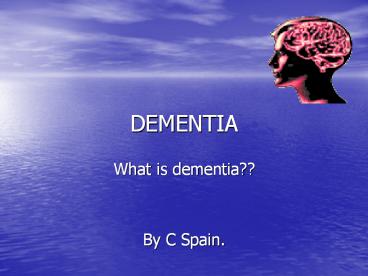dementia - PowerPoint PPT Presentation
Title:
dementia
Description:
Teaching session – PowerPoint PPT presentation
Number of Views:16335
Title: dementia
1
DEMENTIA
- What is dementia??
- By C Spain.
2
WHAT IS DEMENTIA?
- Dementia is a decline in a persons usual state
of functioning. - This could be physical, mental, social or as is
normal a combination of all three. - It is most often seen in persons over the age of
65 but can affect anyone of any age.
3
- There are several forms of Dementia, the most
common one being termed, Alzheimers disease so
we shall concentrate on that one.
4
- Other forms of Dementia include ---
- Vascular dementia
- Lewy bodies dementia
- Huntingtons disease
- Korsakoffs desease
- Jakob-creutzfeldt desease
- Aids related dementia
- Multiinfact dementia
- And others.
5
DEMENTIA
- It is worth bearing in mind that you cannot
diagnose correctly between most types of dementia
until after death and the brain is looked at in a
post mortem. - Because of the high incidents of Alzheimer's
most doctors refer to it as a diagnoses of A
dementia of the Alzheimer's type.
6
- Dementia develops when the parts of the brain
that deal with leaning, memory, decision-making
and language are affected by one or more of a
variety of infections and/or diseases
7
- Most forms of dementia including Alzheimers
disease are not curable unfortunately. - Not everyone will get dementia but the incidence
of it does increase with age
8
WHO GETS DEMENTIA?
9
SIGNS AND SYMPTOMS
10
SIGNS AND SYMPTOMS
- The early signs of dementia are very vague, and
may not be immediately obvious. - However common symptoms include.---
- Progressive and frequent memory loss.
- Confusion.
- Personality change.
- Apathy and withdrawal.
- And the loss of the ability to perform everyday
tasks.
11
SIGNS AND SYMPTOMS
- As the disease progresses these symptoms become
more and more severe and the person becomes
completely lost, wander some and unable to
attend to any of their basic needs including
eating, dressing, washing and toileting.
12
SIGNS AND SYMPTOMS
- They will lose their short term memory, and may
become more and more agitated and confused. - The diagnosis is poor as there is no known cure
but there are medications to help them deal with
the symptoms of dementia.
13
(No Transcript)
14
CAUSES OF DEMENTIA
- There are many ideas why dementia happens, but
no one knows the real cause. - Ideas include---
- Heditory factors
- Head injury ie stroke or a bleed
- Aluminium ie in the water, Atherstone.
- Chromosome as in a gene deficiency
- Alcohol as in Korsakoffs
- Among others.
15
PROBLEMS WITH DEMENTIA
- Dementia brings many problems and difficulties
to both the sufferer and the carer looking after
them. - In the early days of the illness the sufferer may
have insight and know that some thing is not
right with them. They will no doubt be an amount
of confusion and short term memory loss this will
cause the sufferer to have wandersome behaviour
as if they were searching for some thing or some
one.
16
PROBLEMS WITH DEMENTIA
- They may show some degree of agitation and
delusional thoughts may be evident. - This phase is often referred to as First stage
dementia, and is some times the most difficult
to help with.
17
PROBLEMS WITH DEMENTIA
- As the illness progresses They may lose other
functions, such as the ability to eat, drink, use
the toilet, wash, dress, mobility issues, to name
but a few. - Also they may become depressed, memory and
concentration reduces to a minimal amount, and
language difficulties emerge either their
understanding of other people or making
themselves understood to others.
18
PROBLEMS WITH DEMENTIA
- As the brain shuts down, in order to help them
make sense of the world around them they may have
hallucinations and delusions these can be either
visual (more common in Korsakoffs) or auditory. - They will appear to make up stories for their
actions (They may fill in the gaps that their
brain has, to try and make sense of the world
around them) This is some times referred to as
Confabulation.
19
WAYS TO HELP THE SUFFERER
- (In groups look at the problems associated with
dementia and think of ways to help the sufferer
deal with them)
20
(No Transcript)
21
FACTS ABOUT DEMENTIA
- Dementia describes a broad range of symptoms,
such as memory loss, intellect, rationality,
social skills and normal emotional reactions. - There are different forms of dementia
- There is no cure for most forms of dementia but
certain medication can help with the symptoms.
22
FACTS ABOUT DEMENTIA
- About 5-8 per cent of people over the age of 65
have some form of dementia - It is estimated that half of the people in their
80s may suffer from dementia. - The most common type of dementia is Alzheimers
disease making up about 80 per cent of all
dementias.
23
THANK YOU
- C Spain 2007
-
Thanks to the Alzheimers disease society.































